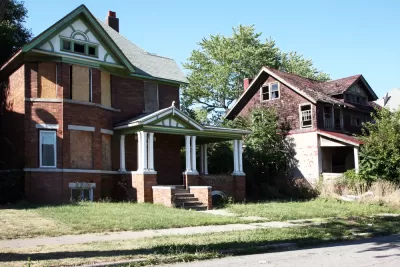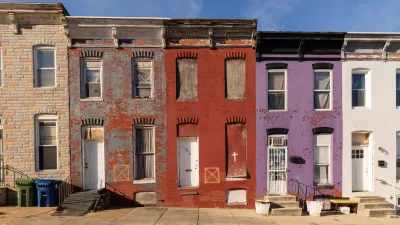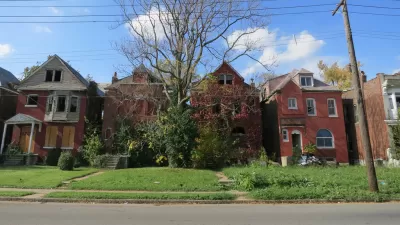It's not your typical walking tour: A resident-led project in Wilkinsburg, Pennsylvania explores the history of a community through its blighted properties.

Founded by Carnegie Mellon students in 2014, the Vacant Home Tour tells the story of blighted properties in Wilkinsburg—a borough of 2.3 square miles with nearly 800 vacant parcels.
Each year, residents volunteer to research the history of vacant properties on the route, put together resources and workshops, and act as tour guides for other community members.
One aim of the project is to "dematerialize" the empty structures, reorienting tour-goers to the human value of former homes. In a Q&A with the Center for Community Progress, organizer Marita Garrett explains:
When people drive or walk by a boarded up home, that’s all they see. By sharing the stories of these homes — the people who lived in them, the businesses they ran in the business district, the holidays that were celebrated in the home, the children that grew up there, the architectural details that made each property so full of character, the gardens that grew in the yard — the Vacant Home Tour aims to honor the value of these properties regardless of what the future holds for [them] (restoration, demolition, or continued vacancy).
Residents old and new—including some featured properties' former occupants—participate in the tour as both guides and visitors, enabling a community-wide conversation about the neighborhood’s past and future. Another key goal of the project is to "reframe the issue of blight as an opportunity rather than a problem," Garrett says:
Blight negatively affects communities, not just because it’s dangerous, but because it can make residents feel hopeless. For those of us who weren’t there during its heyday, it’s hard to imagine Wilkinsburg ever had a heyday. But that’s why preserving that history and that narrative is so important. Wilkinsburg was once the most affluent communities in southwestern PA, so what happened? How can it come back? How can it come back in a way that is equitable for all people? And how can we prevent communities from this type of drastic decline in the future? These are the questions that the Vacant Home Tour raises, and though we don’t have the answers, we are starting the discussion.
FULL STORY: Vacant Home Tour changes the conversation around vacancy in Wilkinsburg

Planetizen Federal Action Tracker
A weekly monitor of how Trump’s orders and actions are impacting planners and planning in America.

Maui's Vacation Rental Debate Turns Ugly
Verbal attacks, misinformation campaigns and fistfights plague a high-stakes debate to convert thousands of vacation rentals into long-term housing.

San Francisco Suspends Traffic Calming Amidst Record Deaths
Citing “a challenging fiscal landscape,” the city will cease the program on the heels of 42 traffic deaths, including 24 pedestrians.

Amtrak Rolls Out New Orleans to Alabama “Mardi Gras” Train
The new service will operate morning and evening departures between Mobile and New Orleans.

The Subversive Car-Free Guide to Trump's Great American Road Trip
Car-free ways to access Chicagoland’s best tourist attractions.

San Antonio and Austin are Fusing Into one Massive Megaregion
The region spanning the two central Texas cities is growing fast, posing challenges for local infrastructure and water supplies.
Urban Design for Planners 1: Software Tools
This six-course series explores essential urban design concepts using open source software and equips planners with the tools they need to participate fully in the urban design process.
Planning for Universal Design
Learn the tools for implementing Universal Design in planning regulations.
Heyer Gruel & Associates PA
JM Goldson LLC
Custer County Colorado
City of Camden Redevelopment Agency
City of Astoria
Transportation Research & Education Center (TREC) at Portland State University
Jefferson Parish Government
Camden Redevelopment Agency
City of Claremont




























